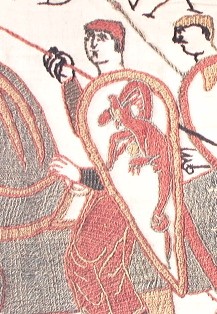Norman shield: Difference between revisions
From Cunnan
Jump to navigationJump to search
No edit summary |
m (Reverted edit of Tiff, changed back to last version by Simoncursitor) |
||
| Line 5: | Line 5: | ||
The design is good for vertical cover and (if strapped to the arm correctly) can quite easily be manoevered to meet leg attacks. It is, however, quite a heavy design, and needs a good strong arm. |
The design is good for vertical cover and (if strapped to the arm correctly) can quite easily be manoevered to meet leg attacks. It is, however, quite a heavy design, and needs a good strong arm. |
||
It should be noted that the gent in the picture has the shield slung at his shoulder, rather than gripped for combat.<br>It is not known now the extant to which such |
It should be noted that the gent in the picture has the shield slung at his shoulder, rather than gripped for combat.<br>It is not known now the extant to which such shields actually were decorated, nor whether any decoration was a proto-example of personal heraldry, an indication of allegiance amongst different bands fighting together, or the artistic choice of the crafters who made the shields. |
||
actually were decorated (although period fiction also gives such images), nor for sure whether any decoration was a proto-example of personal heraldry, an indication of allegiance amongst different bands fighting together, or the artistic choice of the crafters who made the shields. |
|||
[[category:shield]] |
[[category:shield]] |
||
Revision as of 23:31, 10 April 2005
The Norman shield was used by the Normans from the 11th to 15th centuries. It is a large shield, often referred to as a kite shield because of its shape.
The design is good for vertical cover and (if strapped to the arm correctly) can quite easily be manoevered to meet leg attacks. It is, however, quite a heavy design, and needs a good strong arm.
It should be noted that the gent in the picture has the shield slung at his shoulder, rather than gripped for combat.
It is not known now the extant to which such shields actually were decorated, nor whether any decoration was a proto-example of personal heraldry, an indication of allegiance amongst different bands fighting together, or the artistic choice of the crafters who made the shields.
